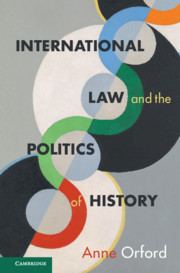Book contents
- International Law and the Politics of History
- International Law and the Politics of History
- Copyright page
- Contents
- Acknowledgements
- 1 Neoformalism and the Turn to History in International Law
- 2 Situating the Turn to History in International Law
- 3 History and the Turn to the International
- 4 History’s Lawyers
- 5 The Past in the Practice of International Law
- 6 The History of What?
- 7 Why Study the Past of International Law?
- Bibliography
- Index
7 - Why Study the Past of International Law?
History as Politics
Published online by Cambridge University Press: 18 June 2021
- International Law and the Politics of History
- International Law and the Politics of History
- Copyright page
- Contents
- Acknowledgements
- 1 Neoformalism and the Turn to History in International Law
- 2 Situating the Turn to History in International Law
- 3 History and the Turn to the International
- 4 History’s Lawyers
- 5 The Past in the Practice of International Law
- 6 The History of What?
- 7 Why Study the Past of International Law?
- Bibliography
- Index
Summary
This concluding chapter argues that the interplay between international law and empiricist history has served to offer a new grounding for formalism in an extremely fraught political context. Historical work is increasingly relied upon as a source of substantive claims about what law really means and of scientific methods for studying the past. Lawyers rely on the scientific tone and resulting truth effects of accounts presented by professional historians to intervene in contemporary debates by using the claims made in those narratives about international law’s ‘true’ origins or ‘real’ history. Appeals to contextualist histories allow lawyers to present their arguments as being grounded on evidence and to characterise the other side in a legal debate as ideologically motivated, presentist, or engaged in myth-making rather than proper scholarship. The chapter argues that international lawyers cannot look to historians (or anyone else for that matter) to save the day with impartial and verifiable evidence-based interpretations of what international law really is, means, or stands for. What then is to be done? The chapter concludes by exploring why and how we might study the international legal past even knowing that writing histories of international law is inevitably a partisan act.
Keywords
- Type
- Chapter
- Information
- International Law and the Politics of History , pp. 285 - 320Publisher: Cambridge University PressPrint publication year: 2021

